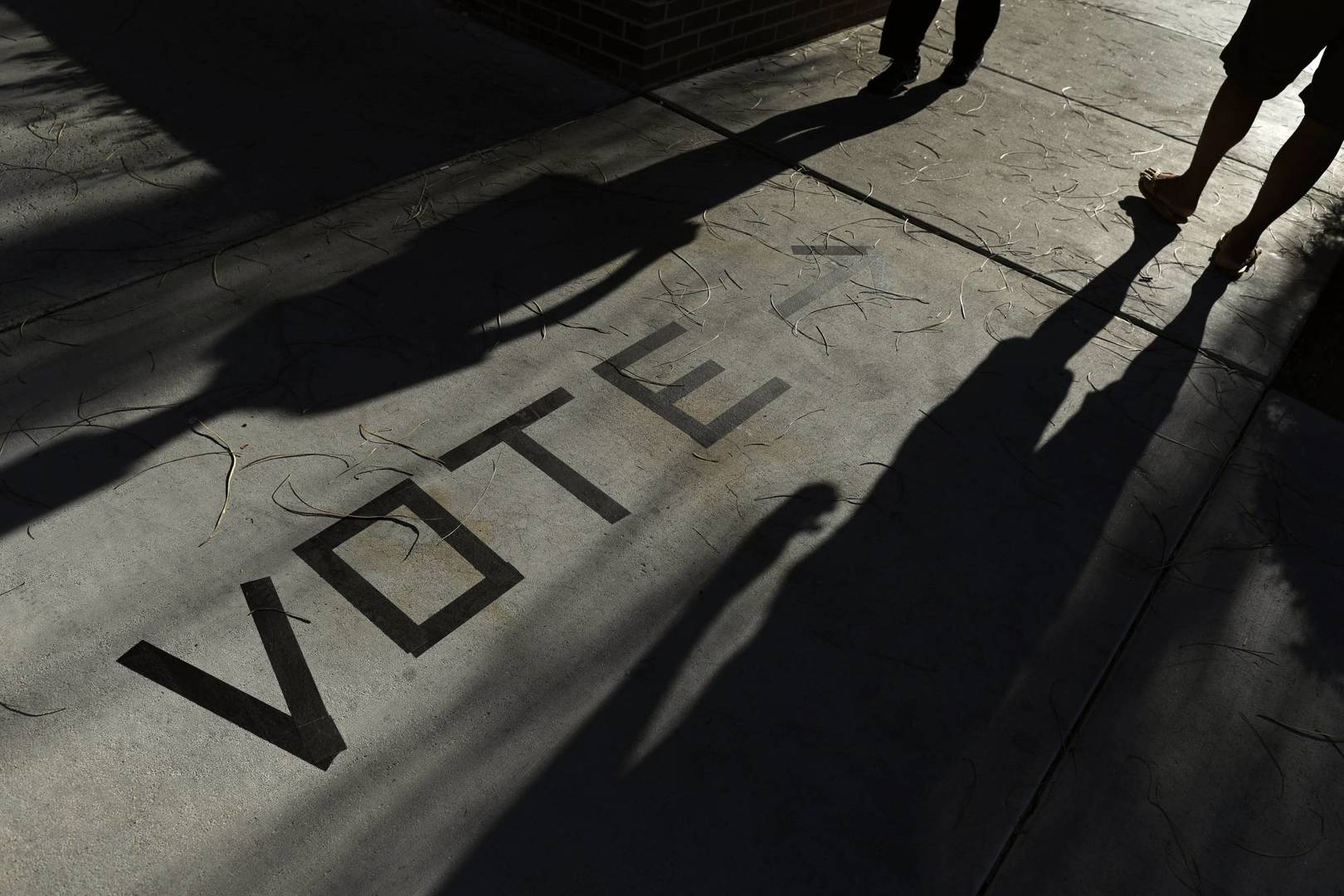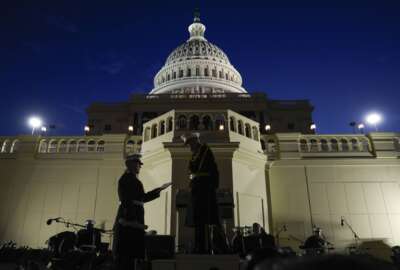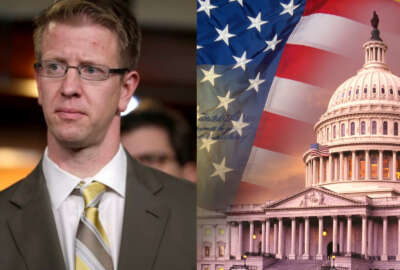One crucial commission asks Congress for a raise
If you think the tax code is complicated, try checking out campaign finance laws. The FEC submitted a list of legislative proposals to the 119th Congress.
If you think the tax code is complicated, try checking out campaign finance laws. They’re administered by the Federal Election Commission. Late last year, the FEC submitted a long list of legislative proposals to the 119th Congress to take up. Ellen Weintraub, the commission chair, joined the Federal Drive with Tom Temin for a summary.
Interview transcript:
Tom Temin: And we have a lot to cover today. But let’s begin with what generally the commission is hoping to fix or change or update with the large 17-item proposal you’ve sent to the Hill.
Ellen Weintraub: Well, let me say, Tom, that we send legislative recommendations to the Hill every year and the six commissioners get together. We’re a bipartisan commission, no more than three from any one political party. So all six of us get together and everybody throws their ideas into the hat. And we only recommend to Congress ideas that have unanimous support of all six of us. And we think that gives the recommendations a little bit more heft, we hope, and hopefully would make Congress take them a little bit more seriously because they have wide bipartisan support on the commission. Some of these recommendations that are on this list that we submitted in December are recommendations that we’ve made before. A couple of them are new, but most of them are actually repeat recommendations. What we’re trying to do is fill some gaps in the law, particularly when it comes to making sure that we can address fraud in the election financing context. And we can make sure that we are preventing foreign nationals from giving in various different ways to various different kinds of organizations. We think there are some holes in the in the statute that need to be filled in. We want to expand the personal use prohibition, which only covers certain committees. So, for example, super PACs are not subject to personal use prohibitions. There is no requirement that someone associated with a super PAC not pocket the money in terms of federal election law. There may be other fraud laws. But it’s not a matter for federal election law, unlike principal campaign committees that candidates have. So we think there are a variety of places where the law could be improved. And then there are some technical fixes about changing the number of days for certain requirements when certain activities have to take place that we think would make our lives easier and the reporting community’s lives easier.
Tom Temin: Right. And has the rise in the click-to-donate idea, has that changed things for the commission or for election oversight in general with millions of people maybe texting a dollar or $10 or something to candidates, especially in the presidential level?
Ellen Weintraub: Absolutely. It is really dramatically, exponentially increased the number of transactions that we need to keep track of. Political committees have to file reports with the commission. They have to report every donation and every expenditure at a $200 threshold. But these days, a lot of people are making donations through other platforms, which themselves as conduits, they have to report everything. So they don’t have the $200 threshold. They have to report every $1 contribution that they get. And as I said, that exponentially increases the number of transactions that need to be reported, that need to be disclosed and that our analysts need to look at. We actually review all the reports. We have a team of analysts. They review all the reports that get filed. So when you’re looking at hundreds of millions of transactions, that’s a pretty heavy burden. And the reality is there’s probably not going to be a whole lot of enforcement action that takes place over a $1 contribution. So it’s a lot of effort in its expense for both the reporting community, as I said, and for the commission. So we would like to tighten up those rules.
Tom Temin: Right. So you have sort of a risk analysis or risk management type of approach, that is. If $0.50 comes from China, well, that shouldn’t happen, but that’s different than a $50 million comes from China.
Ellen Weintraub: Yeah, we have a pretty low threshold for foreign contributions, but there are a lot of other kinds of violations that, you’re right, we probably wouldn’t worry too much about a 50-cent discrepancy.
Tom Temin: And just briefly, what happens when a violation is discovered? You’re not a law enforcement organization, I don’t believe.
Ellen Weintraub: No, you’re wrong. We are indeed a law enforcement organization.
Tom Temin: I stand corrected.
Ellen Weintraub: We have civil enforcement authority over violations of the Federal Election Campaign Act. And the Justice Department has criminal enforcement jurisdiction. But we have civil enforcement jurisdiction. Anybody can file a complaint with the FEC if they think the Federal Election Campaign Act has been violated and our lawyers will review it and they will give us a recommendation and the commission will vote as to whether we want to pursue it or not.
Tom Temin: And so, therefore, you can impose fines or cause money to be returned. What happens if you find, ‘Yeah, they were wrong here?’
Ellen Weintraub: There are fines. There are civil penalties often. We will ask people to correct, make amendments to their reports to fix the public record. We are, at base, a disclosure agency. Our core mission is to make sure that the vast sums of money that are raised and spent on federal politics are disclosed to the American public so they can make informed decisions when they are going into the polling stations.
Tom Temin: We are speaking with Ellen Weintraub. She is chair of the Federal Election Commission. And looking at the transactions reported. You mentioned that the platforms have really increased that and by your own report in the 2018 election cycle. Well, let’s go back to the 2016. There were like 125 million transactions. By 2020, there were 625, roughly million transactions, a little bit less for 2022. What’s going on and what kinds of systems do you have to analyze all that data?
Ellen Weintraub: Well, the ways of making donations have really become pretty frictionless. When the Federal Election Campaign Act was written. In order to make a donation, most people would write a check. Do people still even have checkbooks? Do they know how to write a check anymore? I guess some money still comes in by check, but I think most money is coming into campaigns by some electronic means. And the commission has tried to keep up with technological changes. And we have specifically been asked and have approved different forms of contributing, using the internet, using text messages. There are a lot of different ways and it makes it much easier. In the old days when you had to find your checkbook and write a check and find an envelope and find a stamp and walk to the mailbox, people wouldn’t do that for a 50-cent contribution or for a $5 contribution. It just didn’t seem like it was worth it. But now, when it’s just a matter of a few clicks, people make it very easy to make these political contributions. It opens it up to a lot more people to a whole different class of donors who don’t have a lot to spend, but they have a little bit of money that they’d like to donate to the candidate of their choice. And I think that’s a good thing to expand the pool of people who feel like they want to engage in politics in this way, basically putting their money where their mouth is.
Tom Temin: And do you worry, though, that artificial intelligence and the ability to hide things and have multiple hops on the internet could make it easier for foreign influence, for example, or fraudulent influence to appear as legitimate even to the candidates themselves?
Ellen Weintraub: I do worry about that. And some of the recommendations that we’ve made try and address some of the possibilities for fraud and for foreign intervention. Again, as things get more sophisticated, we have to get more sophisticated in our approaches. Sometimes things will look completely legit and on the surface. But if you dig down a little bit, you find out that the money is not really coming from where you think it is. And there is the problem that I’ve been concerned about increasing number of dollars that are being contributed via what we call dark money entities that don’t fully disclose where they’re getting the money. So super PACs can collect money from corporations. And there are nonprofit organizations set up under, you talked about the tax code, section 501(c)(4) is a popular section of the tax code for groups that organize to collect money for advocacy purposes. And sometimes they also give money to super PACs. But if you’ve got a super PAC that is called the Americans for Apple Pie super PAC and they’re collecting money from the Americans for Apple Pie Corporation, well, that’s not really very informative to the American people. So that is, I think, an ongoing and an increasing problem of trying to really track the money and figure out where it’s really coming from because if you don’t know where it’s coming from, you don’t know where it’s coming from, and you can’t tell on its face whether it’s legal or not.
Tom Temin: And looking at some internal matters for the commission itself as federal employees and appointed people, you’re also asking Congress for a little skosh on the salary front.
Ellen Weintraub: Well, first of all, let me say I feel a little bit uncomfortable about this because I have spent most of my career in public service. I don’t do it for the money. I believe in public service. It’s an honor and a privilege to serve. But I do think that our legislative recommendations touch on issues that affect really the entire government in a couple of ways. We have asked for an increase in the salary for our staff director and our general counsel. Their salary is set under the executive schedule and it is set at a level that now is below that of many of the people that they supervise and that makes it pretty hard to recruit. We have great people right now, but they’re not going to stay forever. It makes it hard to ask somebody to take on more responsibility at a lower salary or to try and find people from another government agency where maybe they don’t have the same restrictions and ask them to take on these kinds of responsibilities is serious and important jobs and to do so at a lower salary level. That just makes it hard to recruit good people. On the commissioner side, I think this reflects, again, a governmentwide problem. There’s been a pay freeze in effect for political appointees basically since 2010. And there’s been a fair amount of inflation between then and now. And I think, listen, I’m not in it for the money, but I think that having a pay freeze for top government employees reflects an attitude that I strongly disagree with, that government employees don’t deserve to be paid a decent salary for the good work that they are doing. I think we have great people in government and we want to attract great people in government and you have to pay people a decent salary in order to do that. And we don’t want, I think, a government that is comprised only of billionaires at the highest levels because that doesn’t reflect the life experiences of most of the American people. And I think we need to have those life experiences reflected at the highest echelons of government.
Tom Temin: And briefly, tell us about Ellen Weintraub, how you came to be chair of the FEC and what else you’ve done?
Ellen Weintraub: Well, I’m a lawyer and chair of the FEC is a rotating position. As I said, we have six commissioners, three days, three hours, and the chair rotates every year. So last year there was a Republican chair and I was the vice chair. This year I am the chair and there’s a Republican vice chair and every year it flips back and forth. As I said, I’m a lawyer. I worked on the Hill for a while. I worked in private practice for a while and I have done political law for most of my career.
Tom Temin: All right. Thank you for a great civics lesson here. Again, this is something we haven’t had on the show, the FEC.
Copyright © 2025 Federal News Network. All rights reserved. This website is not intended for users located within the European Economic Area.
Tom Temin is host of the Federal Drive and has been providing insight on federal technology and management issues for more than 30 years.
Follow @tteminWFED






